Barb Winters's Blog, page 6
September 4, 2023
Sound of Freedom
Sound of Freedom, the movie that packed theaters and reached number one at the box office quickly, is getting a lot of publicity. But the message of the movie is debated. Is it good or bad? Is it positive or negative? Does it help or harm the anti-human trafficking industry? Great questions, but not easily answered, in my opinion.
As with most topics, we can’t peg Sound of Freedom as all good or all bad. I believe those of us in the anti-human trafficking space critiqued the details of the movie more than the average American because of our knowledge on the subject.
Here’s a quick run-down of the plot. A lady poses as a modeling agent and lures a Honduran girl and boy into sex trafficking. This lady dupes the father as well, and he is worried and distraught after they go missing. A special agent for Homeland Security (based on a real person, Tim Ballard) arrests pedophiles. He gets frustrated that he’s not allowed to find the children behind the screen, quits his job, and attempts to rescue the children. The rest of the movie follows him as he baits traffickers and leads operations. He eventually rescues many children, including the boy and girl shown at the beginning of the movie.
Is the message of the movie Sound of Freedom positive or negative? Barb Winters believes both. Here are her reflections and call to action to help end human trafficking. #humantraffickingawareness #soundoffreedom…
Click To Tweet
Here are a few of my reflections.
Keep in mind that the movie is based on a true story, but not everything in the movie is true. Sound of Freedom is a Hollywood movie with sensationalized scenes to enhance the movie-going experience. Polaris Project summed it up well. “The film Sound of Freedom is a Hollywood depiction based on one person’s stories. It should be seen as exactly that — not a comprehensive view of human trafficking nor a model of how to best end human trafficking.”When talking with 8th– and 9th-graders, I say over and over, “Human trafficking is not like the movie Taken.” Yet, in one of the opening scenes of Sound of Freedom, children are snatched off the streets, presumably to be trafficked. Does this happen in the world? Yes. But not typically, especially not in the states. So a parent who watches this scene might sigh from relief, believing their children aren’t at risk. Oh, that’s how this takes place. Over there. Somewhere. I’ve seen the movie twice and really tried to pay attention to whether or not they link pornography to human trafficking. The movie shows a pedophile looking at children on a computer screen (we don’t actually see the photos), portraying him as creepy. My co-worker said, “Look at that bad haircut.” We also are introduced to other “pedophiles,” but I don’t remember the word pornography in the movie. It’s semantics, but as someone who talks about the link between porn and human trafficking, I had hoped the relationship between the two would be clear. I wanted to stand up at the end of the movie and tell the audience, “If those who watch pornography stopped, the sex trafficking industry would no longer exist.”The ending scene shows the rescued girl singing and smiling, grateful to be home, seemingly back to normal. I couldn’t rejoice, as I know that a girl who has been through all she had been would have a long, uphill battle to healing and wholeness. I realize it’s a movie, and we want to have feel-good emotions at the end of movies. However, those rescued out of trafficking do not have nice, tidy lives within hours of escaping. Many will suffer the consequences for years and be victimized again.I’m grateful the movie depicted the father of the boy and girl as loving and caring, willing to do whatever it took to find his children. He was deceived alongside his children. Not all children lured into trafficking have uncaring parents. Many predators, acting as friends, groom and charm parents into a false sense of trust. Then they turn on them and use their children.In a mic drop moment of the movie, Tim Ballard asks why he’s doing what he’s doing. He states, “God’s children are not for sale.” Boom! This should motivate each of us to work against human trafficking.I found the call to action at the end of the movie lacking. I’ll leave it at that. But if you’re wondering what you can do to help end human trafficking, here are some suggestions: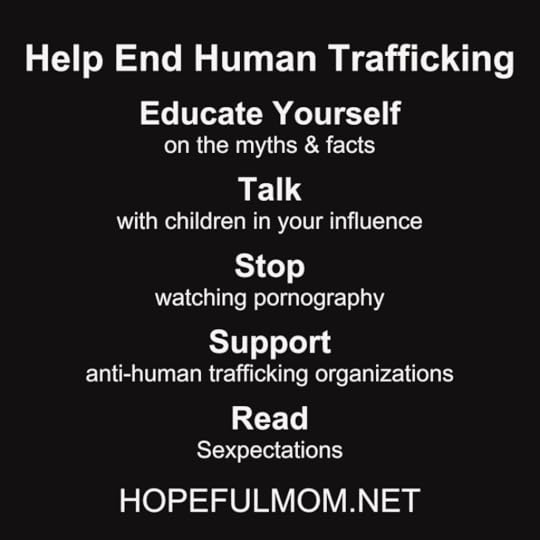
Educate yourself. Know the myths and facts of human trafficking. Hopeful Mom has posts about trafficking and I’ve talked about it on podcasts.
Talk. Most predators groom their targets, luring them and tricking them into trafficking, often through social media. Please make the children within your influence aware of these dangers.
Stop watching pornography. Pornography is harmful on so many levels, but be aware that pornography fuels human trafficking, and human trafficking fuels pornography.
Support an anti-human trafficking organization. There are many out there. Our church is sponsoring a Freedom Sunday in September to support International Justice Mission. In October, A21 sponsors its Walk for Freedom. I will take part in the one near me. Find one near you. Many local non-profits help those who have been trafficked, so find a local place you can support.
Read Sexpectations: Helping the Next Generation Navigate Healthy Relationships. Yes, a shameless plug. Maintaining a healthy relationship with the youth in your lives may keep them from being lured into a trafficking situation.
If Hopeful Mom has benefited you or someone you know, please subscribe and share. Also follow and like on Facebook and Instagram.
The post Sound of Freedom appeared first on HOPEFUL MOM.
August 21, 2023
Scrolling by Example
I met Ashley Jameson at the Sexual Integrity Leadership Summit a few months ago. She’s energetic and passionate about helping spouses through her role at Pure Desire Ministries and at her church. She’s making an impact. I asked Ashley what advice she has for parents and she sent this post on healthy phone use, first published here. I love her authenticity and desire to pass on some words of wisdom to other parents.
I have a secret hiding place, between my fridge and cabinet, where I can sneak on my phone and not be seen by my kids or husband. You may be asking yourself, “Why does this grown woman to hide from her husband and kids?”
Because I’m a hypocrite!
I’m constantly telling my four kids how bad it is to be glued to their phones all day, yet I struggle with this constantly. I can’t WAIT for the day of the week when my husband, Jon, and I share our FASTER Scales together. Just so I can see him highlight “preoccupation with entertainment” because Dork-Sidious has been on that dumb Star Wars game way too much this week.
Don’t worry, he knows I call him that and he thinks it’s funny.
I’m such a HYPOCRITE! If I were honest with myself, and Jon, I would be highlighting “preoccupation with entertainment” as well because I am CONSTANTLY on my phone. Ask any of my friends. You text me and before you even hit send, I will respond. It’s sick.
WHEN REALITY HITS
Recently, I was laying in bed on my phone when my 6-year-old came to hang out with me. My phone let off its notorious “ding!” and I went to pick it up. He walked to the side of my bed, looked me straight in my eyes, with both of his hands out in front of him as if he was REALLY trying to capture my attention. I wonder where he gets that? As he moved his hands slowly up and down he said…
Don’t answer that because you said you were going to slow things down and not be on electronics. That’s what adults do. They work on electronics all day and it gets their brains all mixed up and it’s time to just slow down. That’s what I do. Whenever you tell me I can’t have electronics, I start to whine. You should put your phone downstairs so you’re not ‘attempted.’
Because I work from home, it’s easy to blame my phone overuse on my job. There have been several times when I’ve lied and told Jon or the kids that I’m working when really I’m texting a friend about my belly fat, paint color, or dinner ideas. Okay self…highlight lying on the FASTER Scale. Man, I’m really digging a hole here.
"I don’t want to forsake the precious people in front of me for the people on social media who don’t even know I’m stalking them." ~Ashley Jameson of Pure Desire Ministries – Read how she models healthy phone use here: Scrolling by…
Click To Tweet
HEALTHY PHONE USE
I WANT to be healthy. I LONG for self-control. You know, the kind you see on TV and Pinterest?
Writing this blog is a great reminder that I need to reign in my behaviors. These subtle, sneaky behaviors can be just as damaging as the big obvious addictions.
Have you ever been in the middle of judging somebody on Facebook when your kid comes to show you something and you say, “Hold on. Let mommy finish this”? I have, and I hate this about myself. I don’t want to forsake the precious people in front of me for the people on social media who don’t even know I’m stalking them.
I want to be present.
I want to be engaged.
I want to be a fun mom.
I want to kiss my husband when he gets home.
I want to see my kids when they share their hearts.
In order to do this, I need to be honest, decide what’s important, and start practicing healthy phone use!
I don’t want to hear my teen say, “Why do you get to sleep with your phone in the bedroom, but we can’t have ours in our room?” I want to lead by example. Healthy is healthy. It’s not unhealthy for them to have their phone in their room because they’re teens. We ALL need to have healthy boundaries with our electronics.
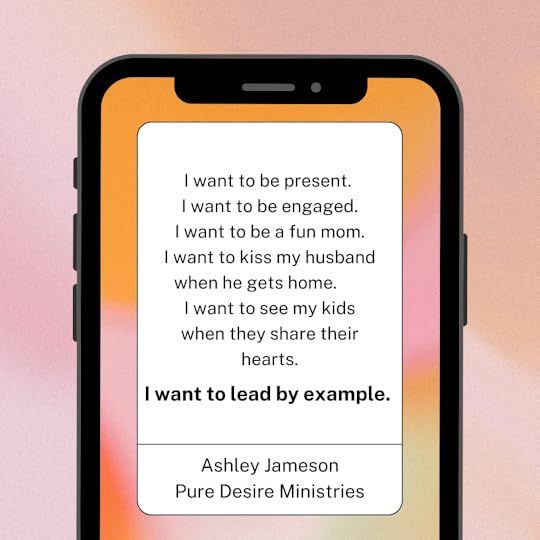
CHANGE STARTS TODAY
Starting today, here are a couple things I am going to commit to practicing! Who will join me?
1. FOCUSED ON ONE TASK
If working, then work. If playing, then play. If driving, then drive. You get the point? Stay engaged and present! You might have to silence your phone or put it on “Do not disturb” so you can stay focused. I once heard, it takes someone 23 minutes to get back on track after being interrupted. You’ll have to fact-check that yourself but NOT NOW; you’re doing something else right now.
2. ROLL THROUGH ROUTINE ONCE
Do you have a special routine when you pick your phone up? Check Facebook, then Gmail, then my bank account, then my texts, then hotmail, stop by my pictures and admire that cute selfie I took the other day (I really did look good in that lighting)… then do it all over again. If I commit to rolling through my routine only once, and then stopping, it really helps cut down the time I waste on my phone. Now, I can “roll through my routine” three times a day but I need to make sure the rolling stops.
3. TIME LIMIT ON SCROLLING
It can feel good to give your brain a rest and look at mindless things. Putting a limit on it will keep us from having to yank yourself out of the twilight zone or battle the shame that accompanies the realization that you’ve just wasted an hour on your phone. Scroll away for 15 minutes and then stop. You’ll enjoy your time more because you know that it’s scheduled and there’s a stopping point.
4. BEDTIME PHONE PLACEMENT
If I put my phone in the kitchen before bed, I sleep better—I can’t check my phone in the middle of the night and get sucked into some juicy article on the brain. When my phone isn’t next to me, I read more, have great conversations with my husband, and often do other things that are great for our marriage, if you know what I mean.  Aside from all of that, it helps me avoid being a hypocrite to my teenage boys and reduces the risk for brain cancer… I think.
Aside from all of that, it helps me avoid being a hypocrite to my teenage boys and reduces the risk for brain cancer… I think.
5. KEEP TRACK When I get really stuck in a bad phone use pattern, I will actually document every time I use my phone. This helps me see how often I reach for my phone without thinking about it. Once I become aware of my behaviors, it’s easier for me to make changes. I would encourage you to do this if you find yourself on your phone, forgetting to follow your own rules.
These will help me engage in healthy phone use.
Having and using technology is not the issue. It’s a reality of the world we live in. Developing healthy phone use boundaries and having practices in place is the issue, not only for the example we’re setting for others, but for our own health: physically, mentally, and relationally.
I’m looking forward to starting this week off right and being present with the people I love!
The post Scrolling by Example appeared first on HOPEFUL MOM.
August 7, 2023
Sexpectations Book Launch Day and Hopeful Mom’s Birthday
When I started Hopeful Mom (originally called Difficult Conversations) five years ago, I didn’t know the impact it would have. All I knew was that I had a burden for other parents struggling with pornography in their home and couldn’t stay silent any longer. I wrote under a pen name for two years.
In August 2020, my family gave me permission to use my given name and Hopeful Mom gained traction. In October of that year, I attended a writers conference and, through the conference, landed an agent. In November 2021, I signed a book contract with Leafwood Publisher and . . .
Today is launch day of Sexpectations: Helping the Next Generation Navigate Healthy Relationships!
Today's launch day for Sexpectations: Helping the Next Generation Navigate Healthy Relationships. We are also celebrating Hopeful Mom's 5th birthday and 100th blog post! Read more here: Sexpectations Book Launch Day and Hopeful Mom's…
Click To Tweet
Before I go any further, I want to take a moment to say THANK YOU! This celebration is not only about Hopeful Mom and Sexpectations. It’s about you – Hopeful Mom friends and community. Many of you have walked through trials with your children and lived to talk about it. Lots of you learned of online dangers and opened your mouth to help your children and friends navigate these difficult conversations.
I applaud YOU! I’m grateful for YOU! And I’m praying for YOU!
 Excerpt from Sexpectations
Excerpt from SexpectationsTo celebrate these joyous occasions, here’s a glimpse into the book, a short excerpt from Chapter 4 “Selflessness.”
Don and I ushered our son into this world on a snowy day two years after walking down the aisle. Our marriage had already endured hardships, including a miscarriage, so we were grateful to celebrate a new baby. We assumed our family was complete.
Entering adulthood, I wanted two children. I wasn’t the mothering type, but when Don and I merged our small families, each bringing a boy into the mix, we agreed to add one more. I hoped for a girl, but I released that desire the day our son was born.
Several years later, God resurrected my dream for a girl when he called us to adopt. After we brought our daughter home, I overheard a relative say, “Now they have his, hers, ours, and theirs.” I was sensitive and protective about my family and its formation. This impolite statement hurt me. I realize now she meant the comment as an explanation, not a judgment. Our circumstances have a unique quality to them, but isn’t every family unique to a degree?
Each child God added to my home, he added to my heart. Each brought trials and joys, tears and laughter, failures—lots of failures—and triumphs. Each burrowed his or her way into my life and my soul. And each chiseled away at the selfish parts.
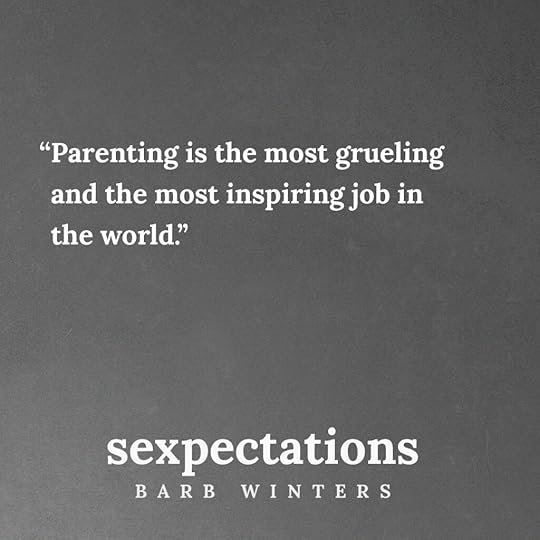
A child can bring out a parent’s innermost ugliness like no one else, causing us to face our own weaknesses, flaws, and limitations. Parenting is the most grueling and inspiring job in the world. We are to lay our own wants, desires, and, at times, needs aside to take care of these beautiful creatures who depend on us for every little thing. I can think of no love outside of God that causes a person to relinquish selfishness as much as love for a child.

Our babies rely on us for life-sustaining food and shelter. Our toddlers require physical protection so they don’t harm themselves. As our children grow and interact with friends and teachers, they need our guidance in the ways of the world.
When they reach the preteen and teen years, they count on our money—and so much more. Our role is to remind them they are not alone, while keeping our distance. This is difficult terrain. Each child is an individual with distinct necessities. And, try as we might, we can’t always predict their requirements or responses to their environment.
Fourteen years after I birthed our baby boy that snowy day, I learned of his pornography habit. Having been a mom for twenty years, along with all the everyday moments and joyous occasions, I’d walked with my children through injuries, botched relationships, and emotional turmoil. I had held their hands through hurts, heartaches, and rejection. I had cried with them and for them. But nothing prepared me for this news. I felt like a failure, and I wanted to escape.
Unlike other relationships, ones with friends, coworkers, or even extended family, I couldn’t walk away from my son. When I wanted to throw up because of his indiscretions, I still loved him. When I wanted to quit because parenting was too hard, I leaned into God and loved my son through another day. When I felt ignorant, unequipped, and useless, I fell to my knees.
At sixteen, my son confessed he was still using pornography. We learned he was addicted. I couldn’t focus. My emotions, ever present, clouded my judgment. I teetered between uselessness and solving the problem by researching, talking, and taking charge. I lay in my bed crying my eyes out one minute and was ready to fight my son’s battles the next. One thing I knew: I could not abandon him. Even if I said and did all the wrong things, even if I was screaming on the inside and hating our situation, I would persevere. My resolve to walk beside him and help him through his decision to quit required an inner strength I didn’t know existed.
“Have a child,” they said. “It’ll be fun,” they said. What they didn’t say is how hard parenting is. How tedious. How long of an endeavor. How it turns your insides to mush because your child has stomped on your heart one day and the next made you proud as a peacock.
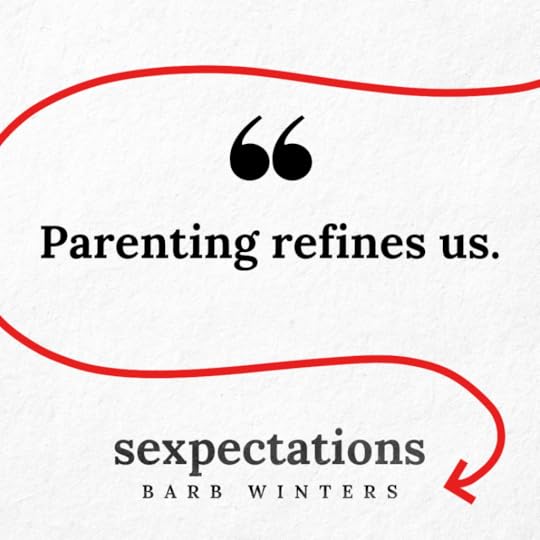
But parenting, if we allow it, also refines us. Parenting reminds us that life is not all about us. God uses our children to show us that our joys and delights originate from him. He uses outside experiences and people, especially our children, to draw us to him, where true love begins—a selfless love.
Order your copy of Sexpectations and see why experts said the following about this faith-based, award-winning book:
“Barb Winters has done an incredible job addressing tough issues all families, churches, and youth groups face. As a therapist, school counselor, and mom of young adults, I’m grateful she is frank about the effects of a sexualized culture, while also pointing to a better way in Christ. A must read for all parents, youth leaders, and anyone needing to connect with today’s youth.”—Brenda Yoder, Licensed Mental Health Counselor, School Counselor, author of Fledge: Launching Your Kids Without Losing Your Mind
Sexpectations is "a must read for all parents, youth leaders, and anyone needing to connect with today's youth." – Brenda Yoder . . . Read an excerpt here: Sexpectations Book Launch Day and Hopeful Mom's Birthday #sexpectations…
Click To Tweet
“Sexpectations is about so much more than sex. It provides a biblically sound roadmap to understand how culture has warped relationships and intimacy, and more importantly, how families can emerge strong and healthy, defying this distortion. Parenting in the digital age is one of the most challenging experiences any of us will ever have, and Barb shares her own stories with refreshing vulnerability. This book will supercharge your sense of purpose as a parent, giving you the courage and tools to more deeply connect with your kids and more resolutely stand against the toxicity of our culture.”—Sarah Siegand, Cofounder of Parents Who Fight
“Sexpectations is a calming voice to parents in the midst of the chaos of trying to talk with older kids about sex. Barb candidly shares her own parenting journey to demonstrate that even when we do not do this perfectly, there can be hope for our kids. I appreciate how Barb goes beyond just “what to say to kids” but includes work that we need to do as parents throughout this process. Sexpectations is an emotional rock for parents to stand on as they navigate these waters.”—John Fort, Director of Training at Be Broken Ministries
Be sure to subscribe for TWO FREE downloads – Sexpectations Questions for Personal Reflection & Group Discussion AND 7 Steps After Your Child Sees Porn.
The post Sexpectations Book Launch Day and Hopeful Mom’s Birthday appeared first on HOPEFUL MOM.
July 24, 2023
Calling for Corporate Change to Protect Kids Online
I recently talked with Dawn Hawkins, the CEO of National Center on Sexual Exploitation (NCOSE). She and her staff work diligently for child safety by exposing the links between all forms of sexual abuse and sexual exploitation. (Be sure to read her impressive bio.) I admire her determination and passion and agreed to help NCOSE however I can. To that end, I asked Dawn to update us on their recent doings and give us advice on what we can do to keep our children safe online.
With the advent of smartphones, most kids carry around amazing technology in their pockets all the time. While this allows for communication with family and friends, constant access to the internet also means predators have unprecedented access to groom and exploit children.
Parents are Overwhelmed!
As parents, we are always trying our best to protect our kids from both physical and online dangers, but it can be overwhelming when there are so many platforms and new technologies. You are already doing so much! The fact that you’re here shows that you are searching for the best ways to help protect and advocate for your children. This is a great resource!
Still, even with great resources and the support of other concerned parents, it can be overwhelming. And it’s also not fair. These big tech companies have created platforms with ineffective, insufficient safety measures that don’t really work. They have created platforms for kids that enable grooming, sex trafficking, exposure to pornography, and the creation and distribution of child sexual abuse materials.
But it shouldn’t just be the responsibility of kids or already overwhelmed parents to keep them safe online! It’s time to hold these companies accountable for the harm they have caused and demand real change. And it’s long past time for tech companies to stop prioritizing profits over child safety.
How Parents Can Demand More Power to Protect Kids
Every year, The National Center on Sexual Exploitation (NCOSE) names twelve mainstream corporations that facilitate, enable, and even profit from sexual abuse and exploitation to the Dirty Dozen List. This campaign seeks to name and shame dangerous companies and to demand they do better. We invite you to join us in calling on these companies to improve child safety on their platforms!
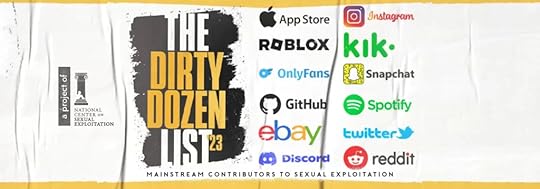
Apple: Fix App Ratings
The Apple App Store was named to the Dirty Dozen List for deceptive app ratings and descriptions that mislead parents about the risks and dangers to children on available apps. Documented dangers on apps include exposure to adult strangers, harmful content, illegal drug activity, easy access to explicit content, and an explosion of financial sextortion. Caregivers cannot trust and rely on App Store age ratings and descriptions to determine what apps are safe for their children when these dangers are not reflected. Call on Apple to fix app ratings here.
Roblox: Demand They Stop Letting Adults Message Kids
Roblox, a popular gaming platform whose user base is 60% kids under the age of 16, exposes children to predators and inappropriate content. In December 2022, a 13-year-old-boy in Utah was kidnapped and sexually assaulted by an abuser he met on Roblox. Thankfully, authorities found him and brought him home, but tragically, this is not an isolated incident. There are countless children who have been sexually abused and exploited by predators on Roblox, yet they still allow adult strangers to message and “friend” children.
Discord: Remove Child Sexual Abuse Materials
Discord is a messaging platform that has been used to groom children and to find and trade child sexual abuse materials (CSAM). This platform enables exploiters to directly contact and groom children and it has shockingly ineffective parental controls, despite its popularity with teens, especially gamers. Several children have been exploited by strangers who contacted them on Discord.
You can make a difference by contacting your legislators to support child safety legislation like the EARN IT Act. ~ Dawn Hawkins, CEO NCOSE Calling for Corporate Change to Protect Kids Online #childsafety #onlinesafety #NCOSE
Click To Tweet
Ask Your Legislators to Vote Yes on Earn It Act
In addition to reaching out to these companies directly, another way you can make a difference is by contacting your legislators to support child safety legislation. The EARN IT Act is the most important child protection legislation pending before Congress this year! This bill protects kids online by clarifying there is NO IMMUNITY for social media and tech companies that knowingly allow the distribution of child sexual abuse materials, and gives victims a path to justice and restoring their privacy. You can learn more about this bipartisan legislation and email your members of congress to support the bill here.
Your Voice Matters!
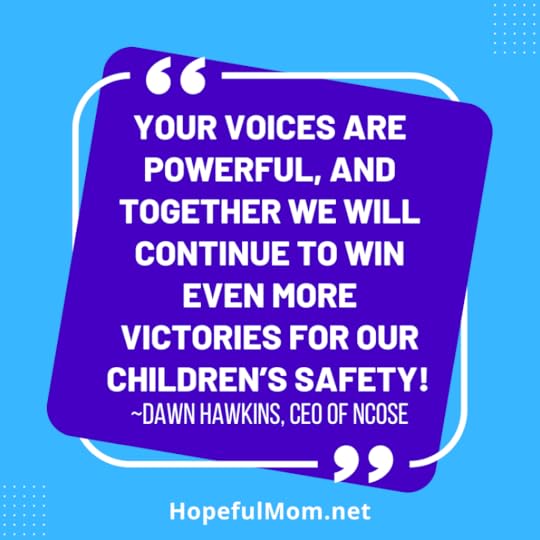
When parents join together, we see massive victories like:
Google Chromebooks, which once exposed kids to pornography on school devices, defaulted to safety by implementing age-based access settings on devices for K–12 students.Discord confirmed that it is testing parental controls after being on the Dirty Dozen List for the past three years.Meta is starting a task force to investigate how Instagram facilitates the sale of child sexual abuse material.Apple recently announced that they would start automatically blurring nudity for kids 12 and under, with the tool available as an opt-in feature for teens and adults.It’s thanks to moms and caregivers like you that these companies are finally starting to listen! Your voices are powerful, and together we will continue to win even more victories for our children’s safety!
The post Calling for Corporate Change to Protect Kids Online appeared first on HOPEFUL MOM.
July 10, 2023
Teens Need a Trusted Adult
“I don’t want to talk with my parents because they always give you a whole speech.”
Last month I attended a three-day adolescent pregnancy prevention conference. During one session, we heard a panel of five teens talk about their personal experiences with risk avoidance/prevention programs at their schools.
I can’t speak for every program throughout the states, only the one my employer uses. When my colleagues and I go to schools, one of our goals is to help students understand the long-term effects of their decisions. We use fact-based evidence and interactive activities to demonstrate potential outcomes of drugs, alcohol, violence, vaping, and sexual activity. We also talk about healthy choices and how those affect their future. I assume most programs and facilitators have the students’ best interest in mind and do their best to guide students toward a healthy future.
During this session, one question the moderator of the teen panel asked was, “When talking about these subjects (sex and sexual activity), would you rather speak with your parents or the facilitator?” The question was asking if the teens would rather talk with their parents or a trusted adult about these uncomfortable topics? I found their answers insightful. Granted, there were only five teen panelists, but I think their answers represent a good percentage of teens, so it’s worth repeating them here for your benefit.
Let’s look at the answers one-by-one.
“I don’t want to talk with my parents because they always give you a whole speech.” I think what we can learn from this answer is that less is more. Our teens don’t need “a whole speech” when we bring up dangers associated with risky behaviors. Ten short two-minute chats are more impactful than one 15-minute lecture. Talk less, listen more. Ask questions. Of course, offer your opinion and state why you believe the way you do, but asking questions helps them make decisions on their own. And when they decide (aren’t just told) to avoid pornography, sending nudes, vaping, etc., they are more likely to stick to their decision and resist in the future.
“It’s easier to express my feelings with a facilitator. With my parents, I get in trouble.” Our children will make unhealthy choices. How we will handle it when we learn of these choices? This is tricky because it’s still our job to parent our children. I think it’s important to keep our temperament in check. I can’t say I have done this well throughout my entire parenting life; however, when I stayed calm, listened, and used less than half the words I wanted to, my children responded to me better. Our children are more likely to trust us if we create a loving atmosphere. They will disclose regretful choices if they know we are on their side.
Parent, remember, if your child watches porn, sends a nude, or ends up in a sextortion situation, they are victims. If they are brave enough to come to you with this information, treat them with kindness and love. Tell them the boundaries you put in place are to protect them and keep them safe, not a punishment.
We want to be our child's go-to person. But sometimes they need another trusted adult to talk with. ~ Teens Need a Trusted Adult #sexpectations #healthyrelationships #hopefulmom
Click To Tweet
“It’s difficult to be vulnerable with my parents.” Again, what type of atmosphere are we creating in our homes? Do we treat our preteens and teens like people? Do we respect them and believe their ideas are valuable? When our children communicate their innermost desires, dreams, fears, and failures, we should validate their thoughts and feelings.
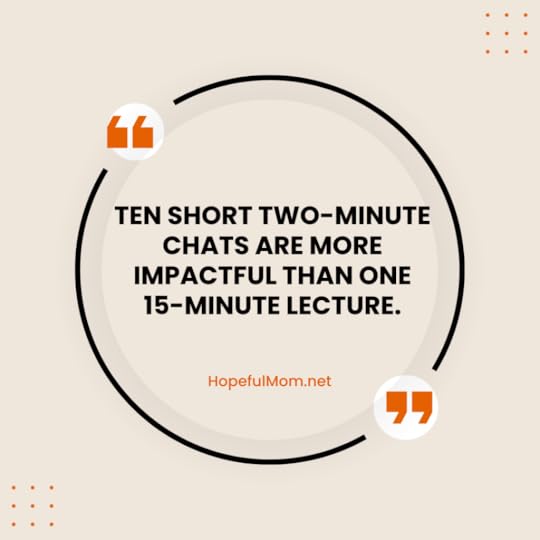
“I could speak with either my parents or the facilitator, but I’d rather speak with the facilitator because they respect me.” This panelist feels comfortable talking with a parent but feels more respected by the trusted adult. Sometimes our children perceive actions or attitudes from us that don’t exist, but sometimes we as parents don’t respect our children. (Do you see a theme?) If we want to establish ourselves as people our children can confide in, we need to bring up these difficult topics regularly. We also need to be okay when our child prefers to speak with a trusted adult who doesn’t live in our household. It may just be that our child feels more comfortable talking with someone else.
“I talk with my parents.” This last panelist would rather speak with parents. Yay! Good job, Mom and Dad. Despite popular opinion, some children will—and do—talk with their parents about the rough stuff.
As I’ve said in the past, parenting is a long endeavor with ups and downs. Thankfully, when we blow it, we have an opportunity to change the way we interact with and parent our children. It helps if we stay humble and remember it’s not about us. The objective is to raise healthy adults who can function well in the world.
Our desire is for our children to bring their problems to us, to talk with us about the hard things, and to listen to our advice. But they may need another trusted adult to bounce ideas off, one who isn’t as close to the situation. That’s okay. Help them find someone you also trust. And keep loving them. You’ve got this!
Do your teens have a trusted adult they turn to for advice? Do they feel comfortable talking with you about their problems? Let us know in the comments.
Share this post with your friends, and subscribe for regular updates from Hopeful Mom. Sexpectations: Helping the Next Generation Navigate Healthy Relationships launches August 8th! Have you pre-ordered your copy yet?
The post Teens Need a Trusted Adult appeared first on HOPEFUL MOM.
June 26, 2023
5 Phases of Tech Training
I’m so excited to introduce you to my friend, Sarah Siegand. Sarah and I met through Safeguard Alliance. I love her enthusiasm and desire to help parents learn about technology. I know you will find her post on tech training informative and motivating. (She didn’t mention it in her bio, so I will . . . She wrote a book! Find it here.)
Technology isn’t going anywhere, and today’s parents need a solid strategy for how their families will either embrace or reject the influence of tech. If the goal is to raise kids who are not enslaved to technology, we must have a long and a short view of intentional strategies at every age and stage. It requires us to train them!
The following phases will help you locate where you are in the training process for each individual child or teen you’re parenting and what skills you will need to build next.
Phase 1: ModelEvery parent starts here, and none of us really graduate from this stage. Our kids are watching how we use technology, as well as gleaning information about how it fits into our family’s values and priorities. When they are on the ballfield, can they catch your watchful eye, or do they see you on your phone? Is a TV always on in your house? How many new technology purchases have you made this year? Do your kids see you reading books or enjoying nature? All of these answers build what your kids understand as your relationship with technology, and consequently, how they should expect to relate to it as well.
Technology isn’t going anywhere, and today’s parents need a solid strategy for how their families will either embrace or reject the influence of tech. 5 Phases of Tech Training ~Sarah Siegand #sexpectations #healthyrelationships…
Click To Tweet
We all know that kids’ brains are not fully formed until adulthood, but it’s important to also acknowledge the way brains are developing in the preteen and the teen years. Generally speaking, puberty and tech can be a dangerous combination. We encourage parents to wait as long as they can for some of the most addictive and potentially destructive kinds of technology, namely YouTube, video games, smartphones, and social media.
What kids see, they try to imitate, with little thought to the consequences. They aren’t mature enough to understand all of the danger or addiction that lies just beyond those open doors. They don’t have the discernment to sift out the good and bad influences available on technology. We think this Dove Beauty video perfectly sums up why we encourage delaying specific kinds of technology that is addictive and can easily open your kids up to dangerous content and ideas.
Phase 3: ProtectThe first layer of protection is building a strong parent-child relationship and having great conversations about technology pitfalls. I use an oven mitt as a visual aid for parents—conversations are the hand inside the mitt, and automated tech boundaries are the mitt itself. Automated protections include things like time limits, parent approval for app downloads, filters on web browsing, and manual tools include things like knowing who your kids are communicating with and not allowing devices in private spaces like bedrooms. Beyond the immediate protection these measures offer, they also build an important understanding in your child that 1) they are worth protecting and 2) there is a real danger to be protected from.
Phase 4: MonitorHow is monitoring different than protecting? Protection includes closing and locking doors to certain dangers online. Monitoring doesn’t prevent your kid from accessing potential dangers, but it does give you information after the fact so you can have a conversation about what happened so they can learn.
Monitoring might include using technology tools like Bark to scan for problematic activity like bullying, sexual content, and more. Or it might be just picking up a phone and looking through things to know what your kid is up to or how much time they’ve spent on the device. The monitoring phase should be a constant flow of feedback and making adjustments. One of the greatest blessings of this phase is when you catch your kid doing things RIGHT.
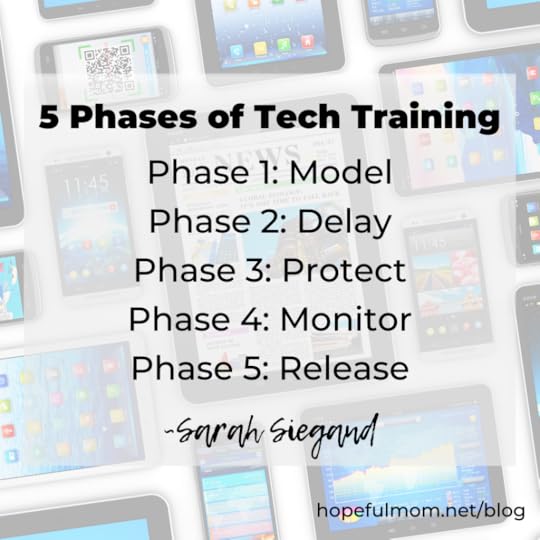 Phase 5: Release
Phase 5: ReleaseYes, parents… one day your kid will walk out your door with a phone in their back pocket that only has whatever safety features THEY have set for themselves. It can be a scary thought no matter how much you’ve tried to pour into them. But if you work from that reality backwards, and see all the present-day tech training through the lens of this unchanging fact, you might find a renewed motivation to get after it.
Our 19-year-old is going off to college in another state in just a few months. He’s never slept with his phone in his room, so as he graduates, we’re getting ready to make that move. He’ll have the summer to adjust, realize where his biggest challenges lie, and hopefully gain some strategies. He can’t take mom and dad to the dorm room, he must learn to do this on his own.
It’s Never Too Late to Start Tech TrainingNo matter how old your kids are, you are bound to find something within your power presently that you can take action on to help them in this training process. If you have a 4-year-old, you have a lot of runway in front of you, and there is great hope that your child will thrive as you intentionally build these skills. If you have a 17-year-old that you wish you could get a do-over with, let me encourage you that your son or daughter is not beyond hope. As you approach the launch from your home (whenever that comes), you’ll have to be very gracious—admit what you know you didn’t do well, and talk about what tech health goals they have as a young adult and how you can support them.
JUST DO SOMETHING, even if it’s putting down your phone to read a book when you know your kids are watching. Or sponsoring a screen-free vacation. Or initiating a family bike ride. We can all do something to improve the overall health of our family in how we relate to technology.
Happy parenting!
For a more detailed look at these 5 Phases, visit Parentswhofight.com.
Remember to subscribe to Hopeful Mom below and share this post with another parent. Someone you know may need this information.
The post 5 Phases of Tech Training appeared first on HOPEFUL MOM.
June 12, 2023
Peer Pressure and Finding Your People
Sexpectations: Helping the Next Generation Navigate Healthy Relationships is coming soon. Don’t miss out on the opportunity to help spread the word. As a gift for helping, you get early access to a digital copy of the book and a FREE print book, as well as other gifts. Check out this link for more information and to complete the form to join.
“But all my friends are doing it. . . You don’t understand what today’s culture is like. . . . My friends will be mad if I don’t participate.”
A force parents combat is peer pressure. “Peer pressure is real, and perception is reality. . . The pressure students experience in middle school, high school, and college is colossal and burdensome. They endure ridicule and face being an outcast if they dress incorrectly, don’t respond to texts in a timely manner, or use an improper filter on their social media photos.” (Sexpectations: Helping the Next Generation Navigate Healthy Relationships, p. 40)
While in the classroom, I try to help students grasp the enormous pull peers have on our lives. We cannot underestimate the power of peer pressure. If we’re honest, we’ll admit we feel it, too. Many decisions are based on what we observe and what the culture dictates. Adults, but more so our children, learn what is acceptable from social media and peers. An innate desire to feel connected and belong steers us to make choices we believe will fulfill the need to fit in. If we don’t recognize it or aren’t able to resist, peer pressure can take us down the path of unhealthy choices.
It’s one reason preteens send nudes.
It’s one reason teens watch pornography.
It’s one reason youth rebel.
But what if we want to make healthy choices and need to walk away from the friend group (or family) who doesn’t understand our new way of thinking and behaving? Old friends may haunt us. Isolation messes with our minds.
Community is important. Belonging is a need. Accountability keeps us on the right path.
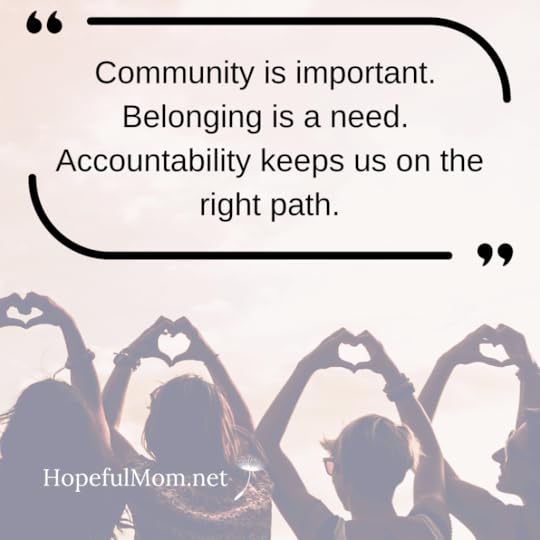
Let me urge you to find people who encourage you and push you in your new endeavors. And if your child is breaking free from a life choice that has taken them down an unhealthy path, be their encourager. Help them find a group of people who will steer them in a healthy direction.
I recently read a blog post by my friend Christy Bass Adams entitled Who’s Your Who? She has this to say.
“What if integrity is now our path and we find the road narrow, deserted, and lonely? Change for the better is always worth it, but sometimes change can be a lonely endeavor. The more authentic we become, the less people will fill our circle. . . . But something amazing begins to happen. The more we work on becoming the best version of ourselves, the more we will attract like-minded, sincere people to join us in our walk. The longer we pursue sound minds and wholeness, the greater chance we will invite similar thinkers into our world. Honesty begets honesty. Integrity begets integrity. Vulnerability begets vulnerability.”
Help your child make new friends. Take them to a youth group. Ask them what community group or after-school group or extra-curricular activity appeals to them. Enroll them in art lessons, music lessons, or a new sport. Encourage them to unfriend or block negative influencers on social media and search for ones who have positive messages.
Negative peer pressure is a difficult force to combat. But isolation isn’t the answer. Help your children find positive influences in their lives. #sexpectations #hopefulmom #fightthenewdrug Peer Pressure and Finding Your People
Click To Tweet
And while you’re inspiring your child, check your own friend list. Who are you allowing to influence you? Christy Bass Adams says, “Finding our who or our new group of whos will take time and intentionality. Listen to people as they communicate. Watch their lifestyle. Pay attention to their interests. And don’t be afraid to initiate a conversation or an invitation to lunch. Friends with depth, sincerity, and convictions are game changers in this life and just like we search hard for a lifelong spouse, we must search hard for lifetime, real friendships. . . . As you search for your who, remember to become the type of person you need as a friend.”
Rather than allowing peer pressure to guide your decisions, make intentional thought-provoking choices. Then be that positive influence in someone else’s life, including your child’s. You’ve got this!
If you found this post helpful, be sure to share it. It may help a friend in need. Subscribe below so you don’t miss a thing.

The post Peer Pressure and Finding Your People appeared first on HOPEFUL MOM.
May 29, 2023
How Can You Help Your Teen with A Pornography Addiction?
There’s a special place in my heart for Dr. John Thorington of Restoring Hearts Counseling. When my son came clean regarding his porn use, I called Focus on the Family. They directed me to Dr. Thorington. Through our conversation and his resources I learned my son had a pornography addiction. I’m so grateful for the time he took to help me and our family. I recently re-connected with Dr. Thorington when he graciously endorsed my book, Sexpectations. (Read his endorsement here.) I’m pleased to introduce him to you !
Internet pornography is quite powerful in capturing the attention of the teen brain. This power can be understood in considering how easy it for people to:
Choose what they want to watch or view any time—and often for free or little cost.Find images that involve sound and motion, which have a more intense effect on the brain.Click through many images in a short amount of time and be exposed to more in quantity and variety in one sitting than through a magazine or DVD.Take advantage of the “Triple-A Effect” of accessibility, affordability, and anonymity.Become addicted to pornography in shorter spans of time because of easy and speedy access to it.McAfee, the world’s largest dedicated security technology company, released insightful findings from the company’s Teen Internet Behavior study less than ten years ago. It found that many teens are accessing inappropriate online content. Specifically, 43 percent of teens have accessed simulated violence online; 36 percent have accessed sexual topics online, and 32 percent have accessed nude content or pornography online.[i] This means teens are accessing images and information about men and women, relationships, and sex at an age when they are most impressionable.
While the problem may be a challenge to quantify, there is considerable evidence that the world has changed—especially for children and teens. Parents often find themselves struggling to know what to do to help their kids.
In a recent meeting with my counselor colleagues, we all agreed that the number of calls from parents on this issue has increased dramatically. It was rare even ten years ago for a counselor to be asked to treat a teen with a pornography addiction, but it is now a frequent request from parents.
I often think of the story of Rip Van Winkle by Washington Irving. It seems as if we are in the world of Rip Van Winkle. One day he wanders into the mountains to go hunting, meets and drinks with English explorer Henry Hudson’s legendary crew, and falls into a deep sleep. He awakens twenty years later and returns to his village to discover that everything has changed. One of Irving’s major points is the tumultuous change occurring over the twenty years that the story encompasses. The connection to 21st-century society is more than obvious!
Having an Internet pornography addiction so young also has serious long-term implications. Here are just a few:
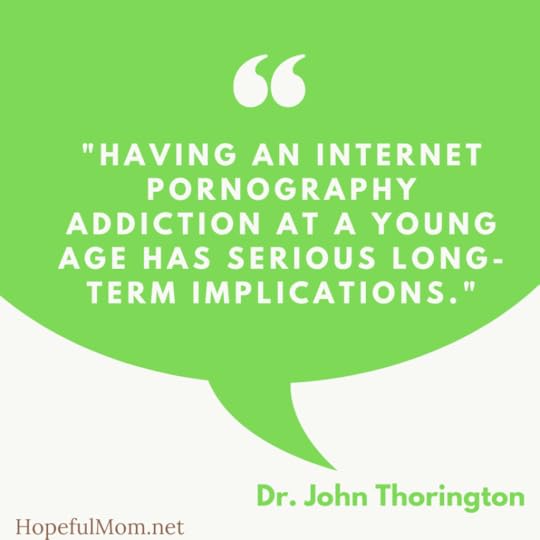 It poisons their view of sex.It desensitizes them to actual relational and sexual satisfaction.It leads to destroyed marriages.It damages their spiritual vitality and connection with God.It hinders the development of their character and integrity.It robs them of their potential and purpose.What can parents do?
It poisons their view of sex.It desensitizes them to actual relational and sexual satisfaction.It leads to destroyed marriages.It damages their spiritual vitality and connection with God.It hinders the development of their character and integrity.It robs them of their potential and purpose.What can parents do?The most important thing is nurturing effective communication with your teen. According to a recent survey commissioned by The National Campaign to Prevent Teen and Unplanned Pregnancy, teens say that parents (38%) most influence their decisions about sex—more than peers (22%), the media (9%), teachers and educators (4%), and others.[ii]
Studies show that teens are influenced by their parents and what they teach them about sex. If parents don’t take on this responsibility, the media and Internet will inform their children. Here are additional parental tips:
Be Proactive. Too many parents either ignore the problem or assume that their kids will never get involved with pornography. Be aware of what your teens are doing online.Set limits. Dr. Karen Koch has written an immensely helpful book called Screens and Teens . She warns that screen time is quickly replacing family time, and it is hard wiring the way teens connect with their world. Parents need to lead by example and limit screen time to give priority to real-time relationships.Provide appropriate teaching and information. Parents can teach their teens about healthy relationships and sexuality. The goal is to teach and exemplify this perspective.Cast a positive vision. The Bible has a saying, “Where there is no vision, the people perish…” (Proverbs 29:18). Parents have a key role to know the gifts and abilities of their teens and to bless them with a positive vision.Treating Compulsive BehaviorThe good news is that Internet pornography addiction is treatable. With parental support and professional help, teens can recover. Faith and hope has a lot to do with recovery.
"The good news is that Internet pornography addiction is treatable." Read Dr. Thorington's thoughts on teen pornography addictions and recovery. How Can You Help Your Teen with A Pornography Addiction? #sexpectations #hopefulmom…
Click To Tweet
There are additional keys to successful recovery. Teens need:
Roadblocks to cleanse their brains (this means some sort of accountability software).To work toward 3-5 months of a porn diet to push the “reset button” on the brain and continue healing of the brain.A medical evaluation for things such as OCD, ADD, depression or anxiety.A mentoring relationship marked by encouragement and accountability.Learning strategies to deal with temptation and relapse prevention.Spiritual guidance to overcome the distortions of pornography and learn the principles of healthy relationships and sexuality.Counseling to help uncover the issues existing before the compulsive behavior so they can deal with the real problem(s) rather than fall back into this destructive coping mechanism.Therapeutic and spiritual help to combat the shame and help them become more grounded in their personal worth and value.Again, parental support is critical as parents need to have conversations and an ongoing dialogue with their teens about intimacy and the meaning of sex.
UPDATE on Sexpectations: We still have room for more launch team members! For more information, read here. Be sure to subscribe below so you don’t miss a thing!
[i] https://callnerds.com/what-your-teen-is-hiding-online-part-1/ — 2012
[ii] https://www.prnewswire.com/news-releases/teens-say-parents-most-influence-their-decisions-about-sex-167680825.html — 2012
The post How Can You Help Your Teen with A Pornography Addiction? appeared first on HOPEFUL MOM.
May 1, 2023
7 Tips for Modeling Healthy Relationships
I pulled into the driveway, opened the front door, and threw my keys on the counter. I saw the dirty dishes in the sink and sighed. After a long day at work, I wanted to put my feet up. But dinner needed tended to, and I had to prepare for an evening meeting.
“Any ideas for supper?” I asked my husband.
“Nope.”
My instinct was to ask him to get out of his chair and help me. Instead, I paused. If I spoke now, the words would not sound kind. Even though he sat with his feet up, I saw his computer in his lap with a document open. Research or writing for Sunday’s sermon. His day, while different than mine, had been filled with responsibilities.
My son, within earshot, also worked hard all day. No one left the dishes in the sink out of laziness or a desire to anger me. I took a cleansing breath, smiled, and began the process of prepping supper. “How was everyone’s day?”
Sometimes modeling healthy relationships is a chore, requiring intentionality and commitment. But in this digital age, this online world, where our children are influenced by social media, videos, and peers, exhibiting healthy relationships in the home is imperative.
Sometimes modeling healthy relationships is a chore, requiring intentionality and commitment. 7 Tips for Modeling Healthy Relationships #healthyrelationships #hopefulmom #parenting
Click To Tweet
Our children are bullied online and in person. They are lured by predators who want to traffic them, pressured by peers to send nudes, and badgered in person to vape or drink. They observe influencers promote sexual promiscuity and entice them with money-making schemes. In the midst of these shaky circumstances, we should be modeling healthy relationships.
Even though our children, at times, don’t show it, we have a huge impact on their beliefs and behavior. Our actions affect their interactions.
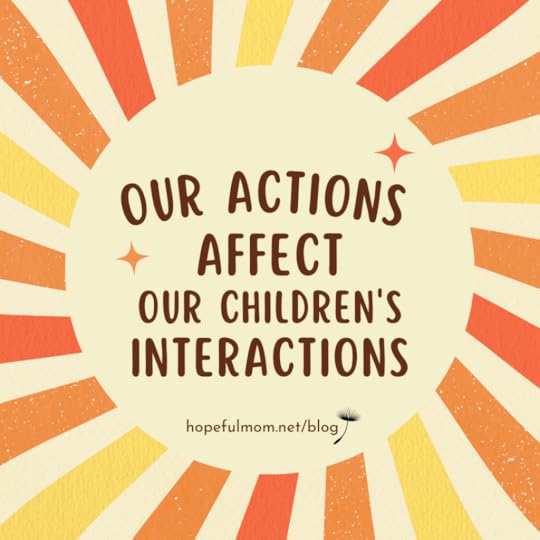 Tips for Modeling Healthy Relationships
Tips for Modeling Healthy Relationships1 – Be Present. I have a pastor friend who says, “Be here while you’re here.” He means that we should be in the moment. Don’t mull over past problems when you should be listening. Don’t think about future tasks when you should be concentrating on the person in front of you. The to-do list can wait. Put the phone down. Don’t multi-task.
2 – Look Them in the Eye. Nothing says “I see you” like looking a person in the eyes. If we want our children to pay attention to us when we speak, we need to pay attention to them while they are speaking.
3 – Actively Listen. Sit quietly, nod, and listen for the purpose of reflecting back what you hear. Save your suggestions, advice, or admonishment until after you’ve heard them out and understand their message. We want to model this behavior with our children, as well as others. Our children witness how we treat our spouse, neighbors, friends, and co-workers. They will mimic our behavior.
4 – Ask Clarifying Questions. Messages aren’t always clear. Before jumping to conclusions, ask clarifying questions.
5 – Treat Your Spouse with Respect and Kindness. If we want our children to be treated with respect and kindness and treat their eventual spouse the same way, they need to see us demonstrate this behavior.
6 – Believe the Best. Believe your child, spouse, and others have pure motives. People are hurting. People have bad days. People have not been taught how to love others well. When we start with the presumption that the person interacting with us means well, we can respond in love.
7 – Treat Them How You Want to be Treated. We’re familiar with the golden rule. When you have a bad day, are tired, or in pain—when your spouse yelled at you and your children ignored you—take a deep breath. The relationship is far more important than winning an argument or completing the task at hand. Nurture the relationship, for your sake and for theirs.
COMING SOON: Information on joining the launch team for Barb’s debut book, Sexpectations: Helping the Next Generation Navigate Healthy Relationships. What’s a launch team? How can you help spready the word about Sexpectations? Watch your email the last few weeks of May for answers to these questions. Don’t miss out! This book has more in-depth information on modeling healthy relationships. Subscribe below!
The post 7 Tips for Modeling Healthy Relationships appeared first on HOPEFUL MOM.
April 17, 2023
Three Truths About Relationships, Kids, Porn, and You
I met Dr. Carol a few months ago when she asked me to be a guest on her podcast. I was immediately drawn to her likeable personality. Carol helps others find transformation through Jesus from thorny issues such as broken relationships, issues around sex/sexuality, mental/emotional problems, and toxic religion. I know you will benefit from her post.
You don’t want your kid hooked on porn. You don’t even want them seeing it.
In today’s world that’s kind of like kids and germs. Well, sort of. Every kid gets exposed to germs, but germs don’t destroy a person’s soul the way porn does. But God put you on this earth in this generation to raise your children in the world we have today. It’s messy. It’s hard.
And you’ve got what it takes.
Let me suggest three truths about relationships, porn, you, and your kid that will help you understand your role as a parent today.
1. Porn destroys relationshipsI’ve lost count of the men and women I’ve talked with who struggle with relationships, intimacy, marriage, and sexuality; it’s what I do. I used to ask them if porn was a factor. Now I ask what role pornography has played in their life and relationship. I have yet to talk with someone where it’s played no role at all.
Pornography is an equal opportunity relationship destroyer; men, women, young people in Africa or Jamaica, in your church group or living next door. Porn disciples a person sexually to make sex all about self-gratification rather than doing the hard work of relationship building. It messes with the templates in a person’s brain. I’m currently working with a couple serving overseas as missionaries whose lives and marriage have been nearly destroyed by porn. The enemy of our souls has worked overtime to create ways to destroy relationships, and porn is at the top of the list.
Scaring your kid about how porn can mess up their future marriage won’t be an effective strategy. That will only add shame and drive the conversation underground and away from you. But this truth can stimulate you to do the work of parenting in this area that you might otherwise be reluctant to tackle.
2. Your child will be or already has been exposed to pornography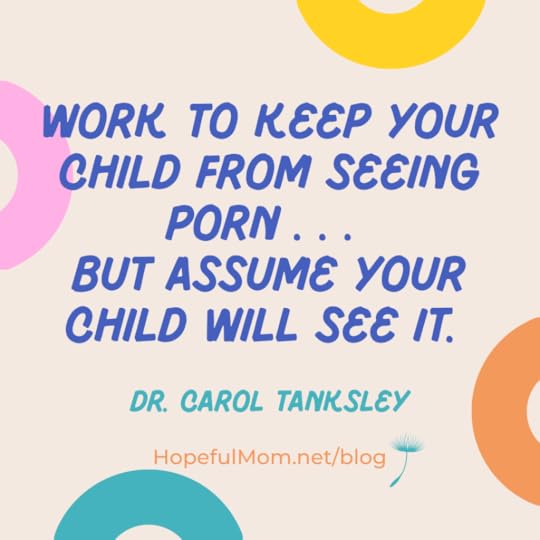
Your child didn’t or won’t wake up one day and decide, “I know what I’m going to do today; I’m going to get hooked on porn.” The only way to 100% guarantee your child won’t see porn is to hermetically seal them in a bubble without human or digital connections to the outside world. Work to keep your child from seeing porn, but assume your child will see it. What do you want them to do next?
Taking extraordinary steps to keep your children from being exposed to destructive things is good. But a perhaps even more important role you have as a parent is to help your children know what to do when they face something, anything, that makes them uncomfortable, confused, or scared. Children are curious; that’s how God made them. Your children are sexual beings; God made them that way too. Help them understand what to do when something happens.
You want your child to come to you when they hear or see something disturbing or that they don’t understand. Research demonstrates that children want their parents to talk with them about sexuality. Become the safe place for your child to ask questions. If you shame them for saying a word they don’t understand or for asking a question, all they learn is “We don’t talk about those things in this family.” That’s dangerous. You need to have a 10-year conversation with your child about relationships, sexuality, marriage – and porn.
"Parenting is hard, perhaps the hardest job in the world. But God has gifted you with what you need." Dr. Carol Tanksley Three Truths About Relationships, Kids, Porn, and You #hopefulmom #fightthenewdrug #pornharmsrelationships
Click To Tweet
Maya Angelou said, ““I’ve learned that people will forget what you said, people will forget what you did, but people will never forget how you made them feel.” That’s nowhere more true than in the relationship between you and your child.
Think of your own sexual story. How did you first learn about sex? Was it adequate? Was it helpful? Almost certainly what made the biggest impression on you was not words; it was what you observed between your parents even if you didn’t know you were learning about sex, or what you learned about dealing with feelings, intimacy, and relationships from what you saw modeled around you.
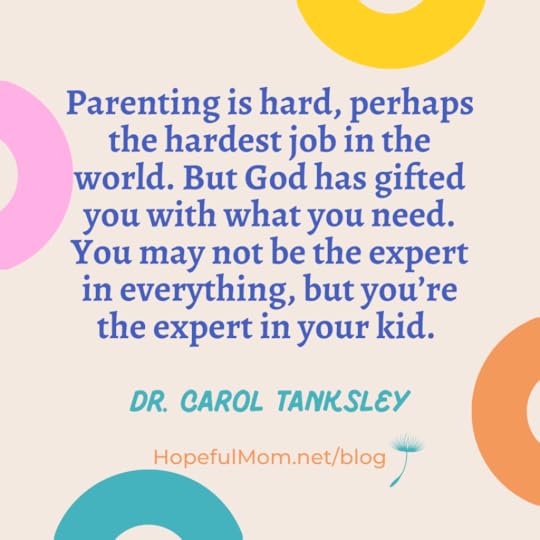
It will be the same with your children. As a parent it’s normal to want to prevent your child from being harmed. But what will make the biggest lasting impact on them will be the quality of your relationship. Parenting is hard, perhaps the hardest job in the world. But God has gifted you with what you need. You may not be the expert in everything, but you’re the expert in your kid. You won’t do it perfectly; there are no perfect parents. But you can do this. And there are tools to help.
A great question to prayerfully ask is, “Lord, who are You calling me to be to my child in this season?”
And then just do the next thing.
Your job as a parent is not to raise good kids; it’s to raise good adults. Your job is to work yourself out of a job. And that includes in the area of sexuality. Don’t focus on keeping porn away from your child, although do that with all the tools you can. But even more, focus on helping your child become equipped to handle hard things. Seek to develop the ongoing heart connection with your child that will have the longest-lasting impact on them both today and throughout their future.
Listen – to your child and to God. Be real. Stay on your knees.
You can do this.
Find more about Dr. Carol at her website. Check out our resources page for suggested filters to protect your devices, and subscribe below so you don’t miss any blog posts.
The post Three Truths About Relationships, Kids, Porn, and You appeared first on HOPEFUL MOM.



